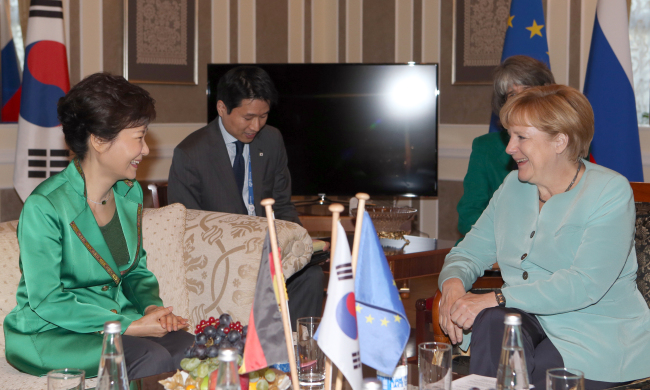뉴스속보 상세보기
ST. PETERSBURG, Russia (Yonhap News) ― President Park Geun-hye on Friday championed her “creative economy” vision and fair market competition as solutions to high unemployment and widening inequalities facing the global economy as she delivered a lead speech at a Group of 20 summit in Russia.
“Creative economy” refers to Park’s trademark growth strategy that calls for boosting the economy by creating new business opportunities, industries and jobs through the fusion of information and communication technology, culture and other realms.
Park believes the existing paradigm of economic growth has reached its limit as it is unable to address high unemployment and widening economic inequalities. She says the world should think up more creative ideas to develop unheard-of industries that can serve as new growth engines.
“Since the global financial crisis, the world economy has been restoring stability to some degree ... But the problems of high unemployment rates and imbalanced growth continue as growth still remains sluggish,” Park said during the closing session of the G20 summit in Russia’s port city of St. Petersburg.
Park said the world economy should seek “inclusive growth” through job creation if it wants to realize the G20 goal of strong, sustainable and balanced growth. Seeking a creative economy based on fair market competition is key to the inclusive growth, she said.
On the sidelines of the summit, Park held one-on-one meetings with German Chancellor Angela Merkel, Kazakhstan President Nursultan Nazarbayev and Russian President Vladimir Putin.
In the lead speech, she cited South Korean rapper Psy’s immensely popular “Gangnam Style” as a good example of the “creative economy” vision, saying the viral song created high added value as it was combined with the video-sharing website YouTube.
“If the past economy used the digging up of mineral resources from the earth as a driving force (for growth), the creative economy is an economy that uses creative ideas from human brains as a driving force,” she said.
A key condition for such an economy is to ensure that competition is fair, Park said, calling for the tearing down of institutional barriers to launching creative start-up firms and uprooting the practice of big firms abusing their market power to push start-up competitors out of market.
The appeal is in line with her “economic democratization” campaign, which calls for creating a level playing field for every economic player amid widespread perceptions that South Korean conglomerates have abused their market dominance to prey on smaller firms.
“Creative economy” refers to Park’s trademark growth strategy that calls for boosting the economy by creating new business opportunities, industries and jobs through the fusion of information and communication technology, culture and other realms.
Park believes the existing paradigm of economic growth has reached its limit as it is unable to address high unemployment and widening economic inequalities. She says the world should think up more creative ideas to develop unheard-of industries that can serve as new growth engines.
 |
| President Park Geun-hye holds a summit with German Chancellor Angela Merkel in St. Petersburg, Russia, Friday. (Yonhap News) |
“Since the global financial crisis, the world economy has been restoring stability to some degree ... But the problems of high unemployment rates and imbalanced growth continue as growth still remains sluggish,” Park said during the closing session of the G20 summit in Russia’s port city of St. Petersburg.
Park said the world economy should seek “inclusive growth” through job creation if it wants to realize the G20 goal of strong, sustainable and balanced growth. Seeking a creative economy based on fair market competition is key to the inclusive growth, she said.
On the sidelines of the summit, Park held one-on-one meetings with German Chancellor Angela Merkel, Kazakhstan President Nursultan Nazarbayev and Russian President Vladimir Putin.
In the lead speech, she cited South Korean rapper Psy’s immensely popular “Gangnam Style” as a good example of the “creative economy” vision, saying the viral song created high added value as it was combined with the video-sharing website YouTube.
“If the past economy used the digging up of mineral resources from the earth as a driving force (for growth), the creative economy is an economy that uses creative ideas from human brains as a driving force,” she said.
A key condition for such an economy is to ensure that competition is fair, Park said, calling for the tearing down of institutional barriers to launching creative start-up firms and uprooting the practice of big firms abusing their market power to push start-up competitors out of market.
The appeal is in line with her “economic democratization” campaign, which calls for creating a level playing field for every economic player amid widespread perceptions that South Korean conglomerates have abused their market dominance to prey on smaller firms.


